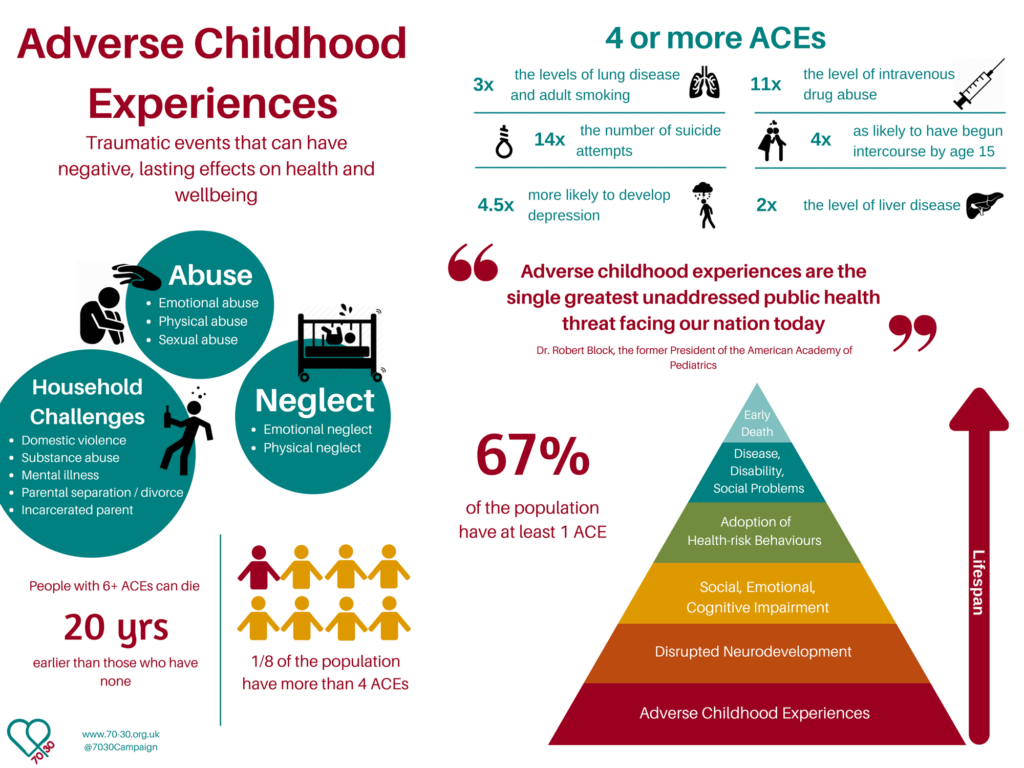I was recently asked the question ‘can a difficult childhood cause anxiety?’ The short answer is yes. In this article, I’ll share my thoughts on this based on clinical experience and knowledge from academic study.
What Are Adverse Childhood Experiences?
We know that adverse childhood experiences (ACEs), such as your parents separating, witnessing domestic violence, or having one or both parents with their own mental health difficulties, can be a significant factor in the development of difficulties with both physical and psychological health in life. Research also shows that the higher number of ACEs that an individual experiences, the more likely they are to go on and develop mental health problems such as depression later down the line.
Are there Any Biological Factors Linked To Anxiety?
When I studied for my CBT training, I remember a statistic that suggested we are about 30% more likely to develop problems with anxiety if our biological parents had problems with anxiety. This means if your parents experienced anxiety, you are more genetically vulnerable to experiencing anxiety yourself. The other 70% was put down to environmental factors such as what we see happen around us, whether at home, school, or other social settings. While these figures may have changed slightly since I did my training, I believe the patterns they highlight are still relevant today.
What About Environmental Factors?
If you grew up with an anxious caregiver, you could have learnt how to think and behave in an anxious way and this learning can stay with you into adulthood. For example, if one of your parents held the belief that ‘thinking of the worst-case scenario means that anything better than that is a bonus,’ it is likely that at some point you will pick up on that idea and start to believe it yourself. The reason for this is that children learn what is modelled to them. If a parent is phobic and frightened of things, the child can learn this by what they observe in their environment.
Thinking about different areas of your life in an anxious way a lot of the time will likely become an issue for you at some point.
What is the Impact of Learning To Think & Behave in an Anxious Way?
The way you think is habitual and can become so subconsciously ingrained. We know that your beliefs drive your behaviour, so unhelpful, catastrophic ideas like the example above can lead you to do all sorts of behaviours such as excessive planning and preparing before doing something new. These behaviours again make logical sense given the content of the belief, however, can go on to become a problem when you struggle to go somewhere new or do something without a comprehensive plan detailing all potential eventualities.
The behaviours also serve to keep the anxious belief in place because we never learn whether something will go wrong or not if we continue to do lots of things to try and prevent bad things from happening. All of this can have quite an impact on friendships and relationships, especially if your loved ones do not hold the same belief and are therefore more spontaneous when doing things.
How Can Therapy Help New Mums With Anxiety?
The good news is, we all hold both helpful and unhelpful beliefs based on our own experiences growing up, and the purpose of psychological therapy is to help you identify what beliefs you may have developed along the way and whether they are currently helping you or becoming more of a hinderance.
For new mums, common examples of negative beliefs can be things like, ‘the world is a dangerous place for me and my baby where bad things always happen’, ‘people will reject me if I don’t parent perfectly’, and ‘I am a really bad mum’.
After identifying the beliefs that are causing you problems, therapy can then help you change some of these to be more realistic while also supporting you to behave in accordance with your new beliefs. More helpful beliefs to hold could be something like, ‘some people have let me down, but not everyone will’, ‘bad things happen, but lots of good happens in the world too’, and ‘I may think I am a bad mum, but I have lots of great qualities that outweigh my shortcomings’.
At the same time, therapy can help you to practice more helpful behaviours such as being more spontaneous and testing how the world really works, rather than how you have been conditioned to think it works from an early age.
Once again, the right therapy, at the right time, by the right therapist trained in the help you need, can make all the difference in helping you heal and move on from anxiety related to difficult experiences from your childhood.
Therapy for New Mums
If you’re struggling with anxiety or any other aspect of motherhood, I can help. Reach out for support by booking a consultation here or subscribe to The Nurture Toolkit for free, actionable tips and prompts straight to your inbox. I also share lots of encouragement and support via Instagram.
Useful Links
What Does Anxiety Feel Like in the Body?
Excessive Reassurance Seeking & Anxiety
